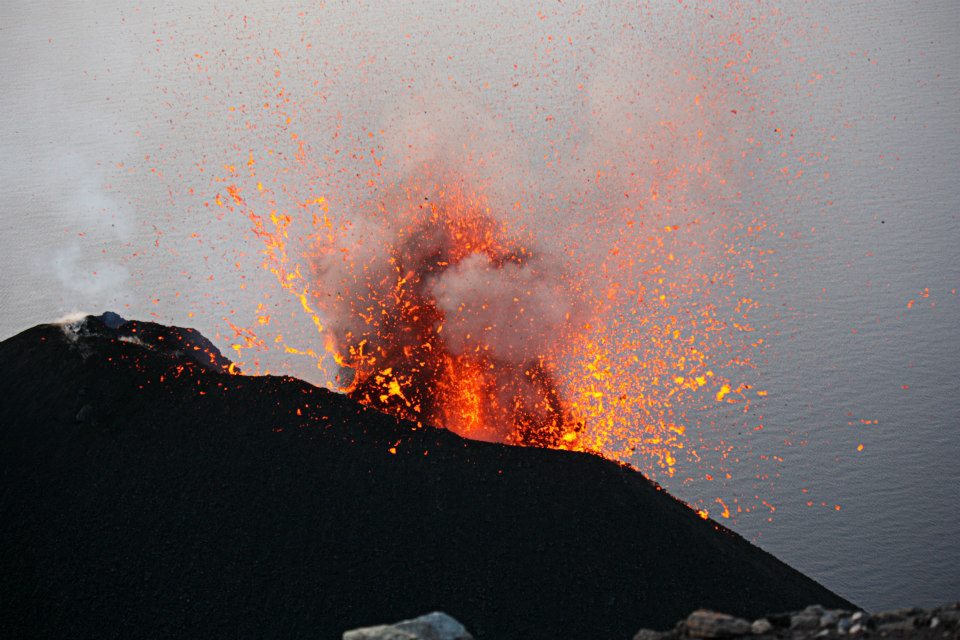The stunning beauty of the Aeolian Islands has attracted explorers and travellers throughout history. The first inhabitants of Aeolian’s arrived around 5000 B.C.; in every island there are visible signs of settlement and archaeological remains. Etruscans, Greeks, Romans before, then Arabs, Christians, Aragons, Turks. The Aeolian Islands are part of the Unesco Heritage List since 2000, according to the two types of eruptions (Vulcanian and Strombolian)provided by the Islands and the important vulcanological studies done.
In last decades the Aeolian Islands have undergone considerable growth process, leading to untenable resource use, waste generation and extensive environmental degradation. With a residential population of 10,000 people, the Municipalities come under huge pressure since more than 100,000 tourists arrive during the summer season. This flow of tourists in a short period of time exceeds the capacity of the Islands ‘environment, and has generated serious demand for water and energy, while producing an increasing volume of wastes.
Issues of concern

Current Issues of concern included:
The Aeolian seas are areas with stunning fish populations. An important step is to create a network of all the local artisanal fishermen. The creation of natural marine protected areas is possible only if we protect local fishermen and involve them in projects and protection activities.
The wealth of fauna and flora of the Aeolian Islands and its clear waters are due mainly to the presence of sea grass that is still widespread along the coasts of the islands. Many prohibitions are not respected and boats are often anchored just above the undisturbed patch of scattered sea grass. It is important to create a monitoring system so to avoid future possibilities of new buildings and construction of marinas. The most important and famous beaches risk disappearing forever if we don’t act now.
The long term objective is to create a well-managed marine protected area across the Aeolian archipelago, to restore fish stocks, promote sustainable artisanal fishing, reduce pollution and protect rare habitats and species.
The Aeolian Islands have the opportunity to create something unique, thanks to the presence of active and exstinct Volcanos. It is also the way to promote an alternative responsible tourism with a revaluation of the existing natural value of Aeolian Islands.
Most of Aeolian Islands’ important habitats are coastal or marine areas, threatened by activities connected to high tourism. Even existing Natural Parks are at risk: protection has not safeguarded fragile habitats and there is no control at all. Tourism and environment protection can be very well connected, so to save the main economy for the citizens and to preserve the natural beauty of Aeolians.
Before the onslaught of tourism, the Aeolian Islands used to be self-sufficient and were farmed. Salina still remains a rural island where you can find agro-biodiversity, ancient seeds and traditional cultivations. Tourism has changed the originality of the islands and caused the abandonment of farming and now the islands’ food supplies depend totally on imports. This has caused not only the loss of the rural landscape and of traditional knowledge, but also has brought an increase in maritime traffic and a lack of essential resources during winter for islands like Panarea, Stromboli, Filicudi and Alicudi. Privately grown crops make up less than 10% of required consumption.
Local agriculture is a resource deserving to be protected and promoted. Before the onslaught of tourism, the Aeolian Islands used to be self-sufficient. Salina still remains a rural island where you can find agro-biodiversity, ancient seeds and traditional cultivations. Tourism has changed the originality of the islands and caused the abandonment of farming and now the islands’ food supplies depend totally on imports.
The AIPF aims to promote the organic agriculture, the incorporation of new farmers to the lands, and to create a database of abandoned farms and gardens offered for ecological farming under a stewardship contract, so to create a chain and start the production and the distribution of Aeolian local products.
The road to optimise the system of waste collection and achieve self-sufficiency in waste disposal, organise staff and facilities, and to ensure high standards is still long and the aim is to train citizens about recycling and ecology and sensitize them through concrete initiatives.
The Aeolian Islands are not self-sufficient in terms of energy and are equipped with diesel power plants that operate by engines owned by ENEL, with the exception of Lipari that has its own power plant. The power output of 4 megawatts and distribution of solar panels is hindered and uncommon. But the Aeolian Islands have an infinite wealth thanks to geothermal energy present everywhere and it would be desirable to increase, even by offering that Enel participate in a project on the use of geothermal energy as an alternative source of energy.